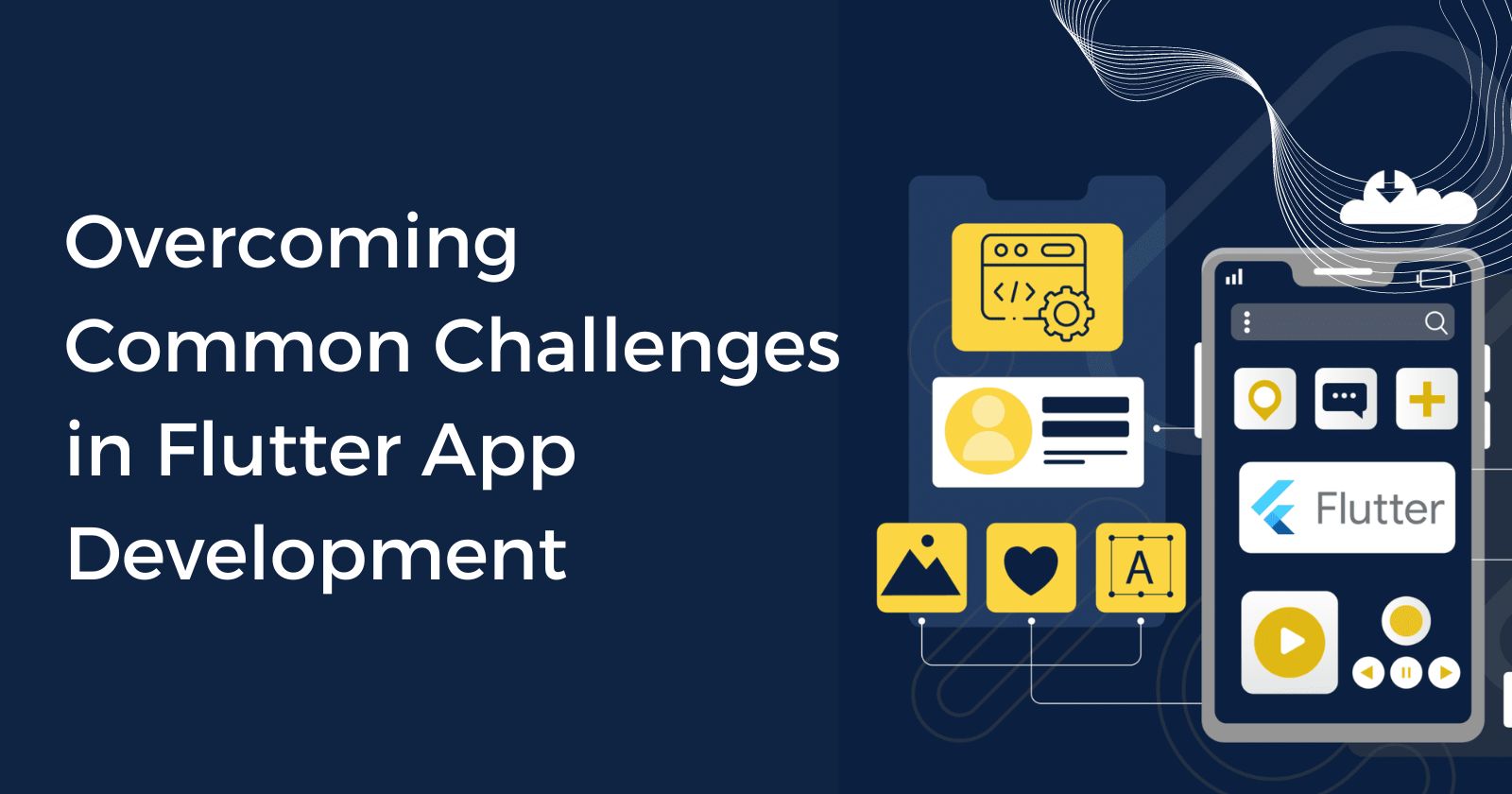Overcoming Common Challenges in Flutter App Development
 Quokka Labs
Quokka Labs
Flutter has emerged as a popular framework for building cross-platform mobile applications. It is known for its fast development cycles and expressive UI. However, like any technology, it comes with its challenges. In this blog post, we'll delve into some common hurdles developers face when using Flutter and explore practical solutions to overcome them.
Explore - Common Challenges & Solution
Platform-Specific Implementations
One of the initial challenges developers encounter in developing Flutter apps is the need for platform-specific implementations. While Flutter provides a single codebase for iOS and Android, certain functionalities require platform-specific code. For instance, integrating device features like biometrics or accessing platform-specific APIs may differ between iOS and Android.
Solution: Utilize platform channels in Flutter to communicate with native code. Flutter's platform channel mechanism allows developers to invoke platform-specific code written in Java/Kotlin (for Android) or Objective-C/Swift (for iOS) seamlessly from Dart, the programming language used in Flutter.
Performance Optimization
Performance is crucial for any mobile application, and Flutter apps are no exception. While Flutter boasts impressive performance out of the box, efficient coding practices or improper widget usage can positively impact app performance, especially on older devices.
Solution: Implement efficient widget rendering by leveraging Flutter's built-in performance profiling tools. Tools like the Flutter Performance Monitor can identify performance bottlenecks early in the development cycle. Optimize the UI hierarchy and minimize unnecessary widget rebuilds to ensure smooth and responsive user experiences across devices.
Third-Party Plugin Compatibility
Integrating third-party plugins and packages into a Flutter project is essential for accessing additional functionalities and libraries. However, maintaining compatibility with these plugins across different Flutter versions and platforms can be challenging. Plugin updates or changes in Flutter versions may introduce compatibility issues, leading to build errors or runtime issues.
Solution: Stay informed about plugin updates and Flutter SDK releases. Before integrating a new plugin, verify its compatibility with your Flutter version and ensure it supports iOS and Android platforms. Collaborate with the Flutter community to address compatibility issues or contribute fixes to plugins when necessary.
Handling Device-Specific Features
Mobile devices offer various hardware features such as cameras, GPS, and sensors. Integrating and handling these device-specific features in a cross-platform framework like Flutter requires careful planning and consideration.
Solution: Leverage Flutter plugins and packages designed specifically for device functionalities. Use camera, geolocation, or sensor plugins to access device features seamlessly across iOS and Android. Ensure proper error handling and fallback mechanisms for scenarios where certain features may not be available or supported on specific devices.
UI/UX Consistency
Maintaining consistent UI/UX across different platforms (iOS and Android) while using a single codebase in Flutter can be challenging. Each platform has design guidelines, navigation patterns, and UI elements that developers must adhere to for a native look and feel.
Solution: Adopt platform-aware widgets and design principles in your Flutter app. Use Flutter's Cupertino (iOS-style) and Material Design (Android-style) widgets appropriately to ensure a native user experience on each platform. Customize themes, fonts, and colors based on platform-specific guidelines to maintain UI/UX consistency across iOS and Android devices.
Debugging and Testing
Effective debugging and testing are crucial for identifying and resolving issues in Flutter apps. Debugging cross-platform apps may require different approaches compared to native development, and ensuring comprehensive test coverage across both platforms adds complexity.
Solution: Use Flutter's robust debugging and testing capabilities. Use Flutter DevTools to debug UI issues, inspect widget trees, and monitor app performance. Implement unit, integration, and widget tests using Flutter's testing framework to validate app behavior across different platforms and ensure code reliability.
Continuous Integration and Deployment (CI/CD)
Another challenge is streamlining Flutter apps' CI/CD pipeline, including automated builds, testing, and deployment across iOS and Android platforms. Managing build configurations, signing certificates, and app distribution requires careful setup and maintenance.
Solution: Implement CI/CD pipelines tailored for Flutter apps. Use CI services like GitHub Actions, Bitrise, or Codemagic to automate build processes, run tests, and deploy updates to app stores efficiently. Configure separate workflows for iOS and Android builds, integrate code signing and versioning, and leverage cloud-based testing services for comprehensive testing before release.
Community and Documentation
Community support and comprehensive documentation can make navigating challenges in Flutter app development easier. However, outdated or insufficient documentation and a lack of community resources for specific issues may hinder developers' progress.
Solution: Engage actively with the Flutter community. Join forums and participate in developer communities like Stack Overflow, Reddit, or the Flutter Discord channel to seek advice, share experiences, and collaborate on problem-solving. Contribute to open-source projects and documentation improvements, or organize local Flutter meetups to expand your network and knowledge base.
State Management
Managing the state effectively across an app can become complex, especially as the app scales with more features and screens. Flutter provides various state management approaches with trade-offs and learning curves.
Solution: Choose a state management solution that fits your app's complexity and team's expertise. Options include a provider package for simple state management, a Bloc pattern for complex applications, or Riverpod for scalable dependency injection and state management.
Localization and Internationalization
Supporting multiple languages and locales is essential for reaching a global audience. Flutter provides mechanisms for localization, but managing string translations and ensuring UI adapts to different languages can be challenging.
Solution: Manage translations by using Flutter's internationalization (i18n) packages, such as flutter_localizations or the intl package. Design UI elements to accommodate text expansion and contraction due to language variations.
Memory Management
Efficient memory usage is critical for app performance and user experience. Flutter apps that don't manage memory properly can face crashes, sluggish performance, or excessive battery drain.
Solution: Use Flutter's memory profiling tools to identify memory leaks and optimize memory usage. Avoid unnecessary object creation, manage large data sets carefully, and utilize techniques like lazy loading and caching for efficient memory management.
Conclusion
Flutter development services offer a powerful solution for building high-quality, cross-platform mobile applications. Developers can leverage Flutter's strengths to deliver robust, performant, user-friendly applications by proactively understanding and addressing these common challenges.
Embrace continuous learning, stay updated with Flutter updates and best practices, and leverage community support to overcome challenges effectively in your Flutter development journey.
Partnering with a reputable Flutter app development company like Quokka Labs LLP can streamline the process for businesses looking to capitalize on these advantages.
Have you faced any challenges in flutter app development that weren't covered here? Share your experiences and how you overcame them in the comments below! Let's continue learning and growing together in flutter app development.
Subscribe to my newsletter
Read articles from Quokka Labs directly inside your inbox. Subscribe to the newsletter, and don't miss out.
Written by

Quokka Labs
Quokka Labs
Quokka Labs is an IT Products & Services consulting company striving to design, develop, and deploy solid and scalable software systems to help enterprises, startups, and brands grow and scale digitally. We are proud to be recognized as one of the top app development companies by GoodFirms and Clutch. Website- https://www.quokkalabs.com/